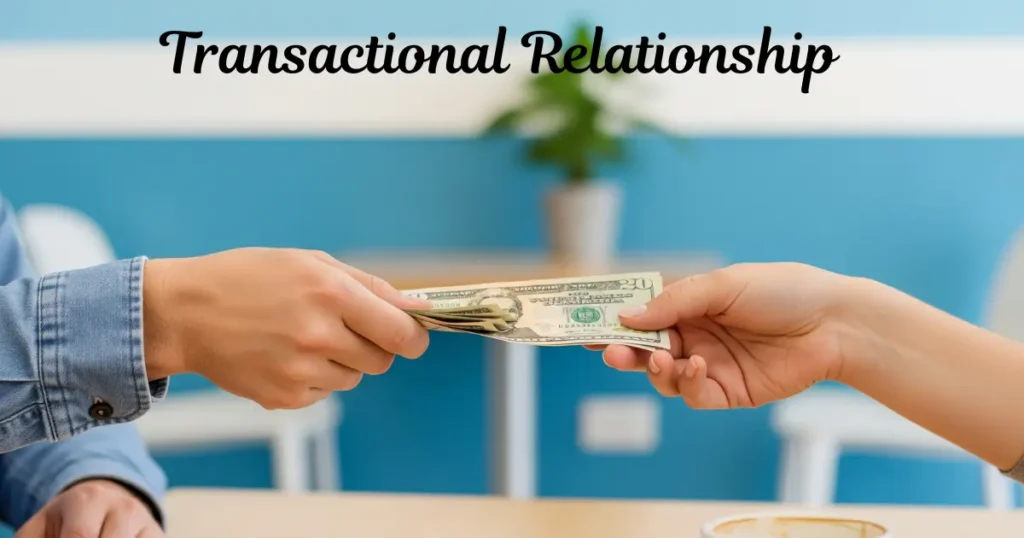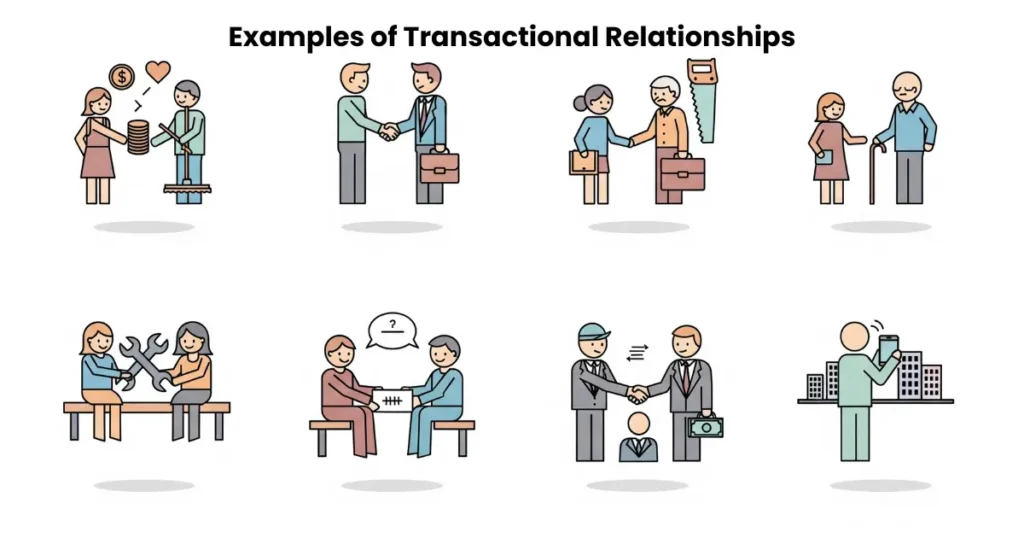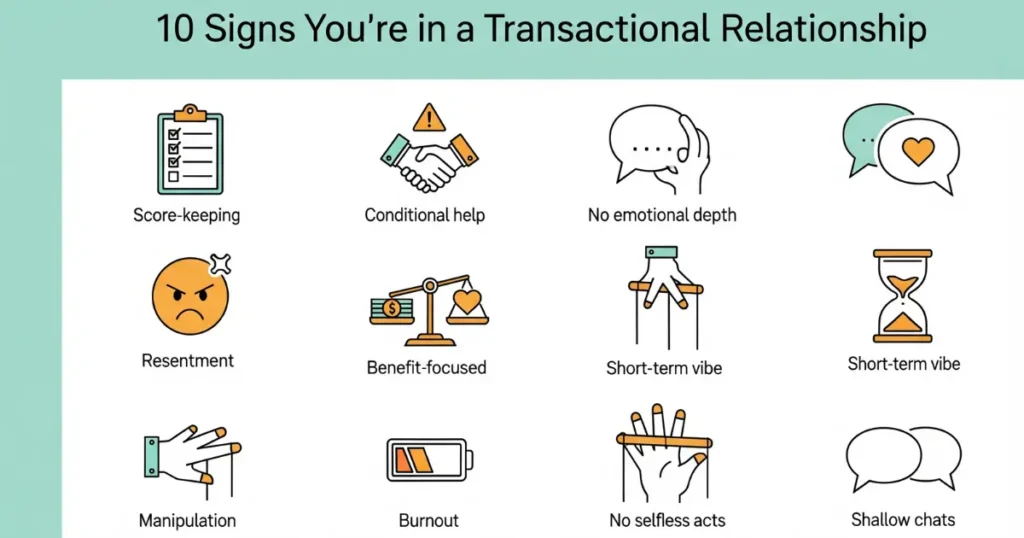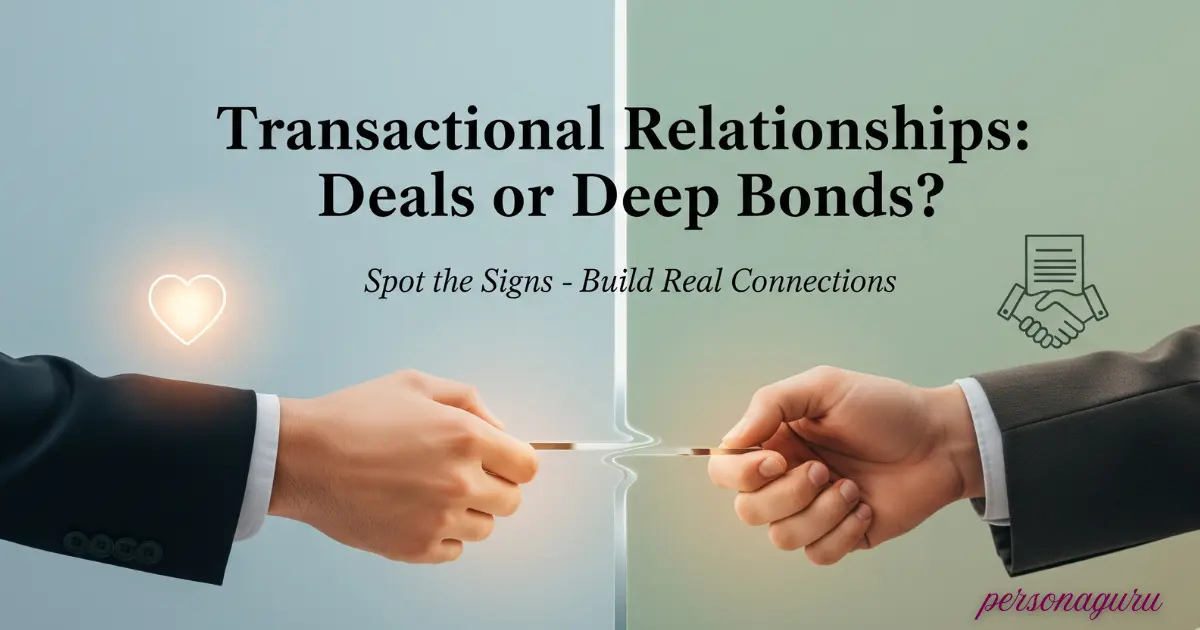Last updated on February 6th, 2026 at 11:23 am
Ever notice your best friend only calls when they need a ride? Or Or maybe your partner shows love only after you do something for them? It doesn’t feel right, does it? This is what we call a transactional relationship—where connections feel more like deals than real bonds.
Simply put, a transactional relationship is one where people exchange things like money, favors, or help, instead of sharing true feelings and care. These kinds of relationships are common, especially in today’s busy and practical world. While they might work well in business, they can leave us feeling empty when it comes to personal relationships.
In this guide, we will look at what transactional relationships are, how to spot them, examples, the psychology behind them, their pros and cons, and how you can build healthier, closer connections. Let’s get started!
Key Takeaways
- Transactional relationships focus on give-and-take, not unconditional care.
- Unlike relational bonds, they prioritize benefits over emotional growth.
- Look for signs like score-keeping or shallow connections.
- They are practical but often unfulfilling long-term.
- Open communication and empathy can transform these bonds.

What is a Transactional Relationship?
So, what exactly is a transactional relationship? Think of it like a deal—you do something for someone and expect something back in return. It’s a connection based on mutual benefits, like favors, status, or support, rather than genuine care or love. For example, you might help a coworker because you want job opportunities, or stay with a partner mainly for financial reasons.
Unlike close, growing relationships that are built on trust and emotional connection, transactional relationships are usually practical and short-term. Relationship expert Dr. John Gottman says, “Relationships depend on emotional responsiveness, not just exchanges.” In other words, transactional relationships are about “I’ll do this if you do that,” while healthy relationships ask, “How can we grow together?”
Here is a quick comparison:
| Aspect | Transactional Relationship | Relational/Transformational Relationship |
| Focus | Exchange of benefits | Emotional connection & growth |
| Duration | Often short-term | Long-term & resilient |
| Depth | Surface-level | Deep, empathetic |
| Example | Networking for job leads | Lifelong friendship |
Transactional Relationship Meaning and Definition
Transactional relationships mean interactions feel like trades. Each action comes with an expectation of return, like a contract. The term stems from Social Exchange Theory, pioneered by George C. Homans in 1958, which suggests people weigh costs (effort, time) against rewards (support, status) in relationships.
Definition: A bond where actions are motivated by expected benefits, not affection.
Synonyms: Quid pro quo, reciprocal bond, exchange-based relationship, utilitarian connection.
In 2024, a Psychology Today article noted that transactional dynamics are rising in workplaces, with 62% of employees reporting “quid pro quo” networking behaviors.
Key traits:
- Clear expectations for both sides.
- Focus on mutual gain.
- Risk of resentment if the deal feels uneven.
Examples of Transactional Relationships
Transactional relationships are everywhere. Here are eight relatable examples:
- Romantic: One partner pays bills, expecting the other to handle chores or offer loyalty.
- Professional: Colleagues connect only for career boosts, like sharing job leads.
- Family: Adult kids care for parents, hoping for an inheritance.
- Friendships: Pals who only meet for favors, like borrowing tools.
- Friends with Benefits: Physical intimacy without emotional depth.
- Business: An employer pays for work; no personal connection needed.
- Politics: Leaders trade endorsements for future support.
- Social Media: A 2025 X post described modern dating as “transactional—people swipe for status or perks, not love.”
Real Story: On a Reddit-like forum, “Aarti” shared: “My ex only showed affection when I cooked or paid for dates. It felt like a job, not a relationship.” This highlights how transactional dynamics can drain personal bonds.

Psychology Behind Transactional Relationships
Why do we fall into these patterns? Psychology has answers.
Social Exchange Theory: Developed by Homans and later John Thibaut, it says we evaluate relationships like mini-economists, balancing effort vs. rewards. If the payoff feels worth it, we stay.
Attachment Styles: Avoidant people, wary of closeness, often lean toward transactional bonds to stay safe.
Influences:
- Trauma: Growing up with conditional love can wire us for transactions.
- Culture: Competitive societies, like post-2020 economic shifts, push practical exchanges.
- Transactional Analysis: Eric Berne’s 1960s theory sees interactions as “transactions” between ego states (Parent, Adult, Child), explaining why some feel scripted.
Signs You are in a Transactional Relationship
Wondering if your bond is more deal than delight? Check these 10 signs:
- Score-keeping: Tracking who did what last.
- Conditional help: Support only comes with a catch.
- No emotional depth: Talks stay surface-level.
- Resentment: Anger when exchanges aren’t equal.
- Benefit-focused: The bond hinges on gains, not care.
- Short-term vibe: Feels temporary, tied to needs.
- Manipulation: Favors used to control.
- Burnout: Constant calculating feels draining.
- No selfless acts: Everything has strings attached.
- Shallow chats: No vulnerability or fun for its own sake.

Quick Quiz: Are you in one?
- Feel guilty if you don’t repay a favor? (Yes/No)
- Rarely share deep emotions? (Yes/No)
- Keep tabs on who owes what? (Yes/No)
Mostly “yes”? Time to rethink your dynamic.
Pros and Cons of Transactional Relationships
| Pros | Cons |
| Clear boundaries & expectations | Emotionally shallow |
| Efficient & goal-driven | Can cause loneliness |
| Works for business or projects | Risks resentment |
| Easy to enter/exit | Unsustainable long-term |
Transactional vs. Transformational Relationships
Transactional bonds focus on trades, transformational ones inspire growth. Think of a mentor who pushes you to shine without expecting direct payback.
Case Study: “Mark” shared online: “My marriage was transactional—I paid, she organized. Therapy helped us focus on shared dreams, making it transformational.”
How to Avoid or Fix a Transactional Relationship
Ready to shift? Try these 7 steps:
- Talk openly: Share feelings, not just deals.
- Be vulnerable: Open up without expecting returns.
- Act selflessly: Do kind things just because.
- Build trust: Stay reliable and honest.
- Show gratitude: Appreciate others genuinely.
- Set shared goals: Focus on growth together.
- Seek therapy: A counselor can guide change.
As Homans noted, “Social behavior is an exchange of goods, but the exchange can become more when trust is built.”
Quotes and Insights on Transactional Relationships
Wise words add depth:
- “Only love that flows despite anger or indifference is true love. The rest is just a transaction.” – Vironika Tugaleva
- “Healthy relationships balance reciprocity with care.” – Dr. John Gottman
- “There is nothing wrong with transactions in relationships, but problems start when they replace intimacy.” – Adapted from Teal Swan
- According to licensed psychologist Dr. Nicholas Forlenza, PhD, transactional relationships are an inevitable and often necessary part of society. He explains that these relationships can provide clear boundaries and practicality, especially in business and casual contexts. However, Forlenza warns that when close personal bonds start to feel purely transactional, emotional distance and feelings of being used or undervalued can develop, which harms trust and intimacy.
Conclusion
Transactional relationships are part of life—in work, friendships, or even romance. They’re practical but can leave you craving more if they dominate personal bonds. By spotting signs, understanding the psychology (like Social Exchange Theory), and taking steps like open communication, you can build deeper, more meaningful connections.
Ask yourself: Are your relationships deals or delights? Share your thoughts below or explore our guides on Building Trust in Relationships and Types of Relationships for more.
FAQs
What is a transactional relationship?
A bond based on exchanges, not emotional closeness.
What does transactional relationship mean?
It’s when you interact expecting a payback—like helping a friend only because they’ll owe you one.
What’s an example of a transactional relationship in marriage?
One spouse pays bills, the other offers loyalty—but it feels like a contract, not love.
Why do people have transactional relationships?
Fear of vulnerability, low self-esteem, or learned habits drive them. Economic pressures, like job insecurity in 2024, amplify this trend.
Is a transactional relationship good?
It’s fine for short-term goals (like work deals) but harmful in personal life if it blocks deeper bonds.
Can a transactional relationship become relational?
Yes, with effort like honest talks and empathy.

